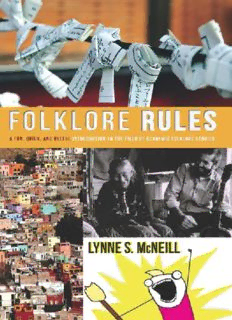
Folklore Rules : a Fun, Quick, and Useful Introduction to the Field of Academic Folklore Studies. PDF
Preview Folklore Rules : a Fun, Quick, and Useful Introduction to the Field of Academic Folklore Studies.
Folklore Rules Folklore Rules A Fun, Quick, and Useful Introduction to the Field of Academic Folklore Studies Lynne S. McNeill Utah State University Press Logan © 2013 by University Press of Colorado Published by Utah State University Press An imprint of University Press of Colorado 5589 Arapahoe Avenue, Suite 206C Boulder, Colorado 80303 All rights reserved Printed in the United States of America The University Press of Colorado is a proud member of the Association of American University Presses. The University Press of Colorado is a cooperative publishing enterprise supported, in part, by Adams State University, Colorado State University, Fort Lewis College, Metropolitan State University of Denver, Regis University, University of Colorado, University of Northern Colorado, Utah State University, and Western State Colorado University. ∞ This paper meets the requirements of the ANSI/NISO Z39.48-1992 (Permanence of Paper). Figure 4.1, “Omikuji,” is courtesy of Alex Anderson (abanderson.com). Figures 4.2–4.7 are based on Allie Brosh’s Hyperbole and a Half. Library of Congress Cataloging-in-Publication Data McNeill, Lynne S. Folklore rules / Lynne S. McNeill. pages cm ISBN 978-0-87421-905-0 (hardback) — ISBN 978-0-87421-906-7 (e-book) 1. Folklore—Study and teaching. I. Title. GR45.M36 2013 398.2071—dc23 2013019566 Cover illustrations, clockwise from top: Alex Anderson (abanderson.com), “Omi- kuji”; Van E. Porter, “Zonnie ‘Grandma’ Johnson and Barre Toelken”; © Allie Brosh (hyperboleandahalf.blogspot.com); Zander Westendarp, “Guanajuato 2013.” For Barre Toelken Contents Preface ix Acknowledgments xi For the Instructor: Why You Want to Use This Book xiii Chapter 1: What Is Folklore? 1 Chapter 2: What Do Folklorists Do? 20 Chapter 3: Types of Folklore 37 Chapter 4: Types of Folk Groups 65 Conclusion: What Do I Do Now? 89 About the Author 91 Index 93 Preface T he field of folklore studies has had a fascinating and complicated history, growing out of and blending several different established areas of study. It is also, for all its seeming simplicity, a very complicated field to sum up and explain; the fact that defini- tions for folklore are still being created and debated well over 100 years after the term was coined proves this. On a related note, the field has also long been suffering from a prolonged and depressing identity crisis, one that each new generation of scholars has inher- ited and must come to terms with, and one that is, unfortunately, often foisted upon students. The reality is that folklore, as a field of study, is cool. Students know this, they can sense it, and when they find themselves in a class reading a textbook that right from the get-go tries to account for all the difficulty in definition, all the ambiguity of placement in the academy, all the questions of naming and whatnot, they’re dis- appointed. The field needs a textbook that lets folklore be both fun and complicated. Folklore Rules doesn’t deny the academic rigor of the field; it simply shows new students that there is something both coherent and, yes, cool, to be studied here. Once students buy into that, chewing over the complexities actually becomes fun. The field also needs a textbook that’s relatively short; it’s not always feasible to take an entire semester introducing new students to the field of folklore studies. Many folklorists are not employed in departments that offer generalized folklore courses; when they teach folklore-related classes, they are often special-topics courses that throw unsuspecting and unprepared students into a field that is new to them but to which there is no time to offer a full
Description: